The order of ancestors
« previous post | next post »
Reader MH wrote to ask "I was wondering if the following phenomenon is backed up by any data, and if so, if it's unique to English", with respect to a bit of Twitter social science, wherein happymrlocust asked
Tell me twitter, when you refer to your grandparents together, who comes first, the grandmother or the grandfather?
and learned that:
Possibly this is an english language thing, but most replies have been "grandma first". Which is very curious.
We don't learn why happymrlocust finds this suprising, but I'll assume that the phenomenon of interest to MH is the verbal order of grandparents. We can start by (semi-) confirming the reported twitter polling data:
| LDC Tel | LDC News | COCA | NYT.12 | |
| grandpa and grandma | 3 | 26 | 39 | 5 |
| grandma and grandpa | 20 | 175 | 117 | 499 |
| grandfather and grandmother | 1 | 50 | 28 | 4 |
| grandmother and grandfather | 5 | 46 | 33 | 6 |
This evidence suggests that for the colloquial forms, "grandma and grandpa" is indeed strongly preferred over "grandpa and grandma": 3-to-1 in LDC telephone conversational transcripts; 7-to-1 in LDC news archives; 3-to-1 in Mark Davies' COCA corpus; 100-to-1 in the past year of NYT archives. These are pretty consistent, except for the NYT counts, where something funny must be going on.
(And by the way, just to confirm the observation that Google counts no longer have even order-of-magnitude comparative validity in matters of usage (if they ever did), Google gives us 1,610,000 hits for "grandpa and grandma", compared to 577,000 for "grandma and grandpa".)
For the full forms — "grandmother and grandfather" vs. "grandfather and grandmother" — there's apparently not any strong preference in either direction.
As for why common binomial phrases should have preferences in one direction or another, the literature on this general topic is more than two millennia old, beginning with Pāṇini's rules for word order in dvandva compounds (discussed in Fritz Staal, Word Order in Sanskrit and Universal Grammar, 1967). The literature continues in Yakov Malkiel "Studies in irreversible binomials" Lingua 8: 113-160, 1959; William Cooper and John. R. Ross, "World order", in Papers from the parasession on functionalism, 63-111, CLS 1975; Steven Pinker and David Birdsong, "Speakers’ sensitivity to rules of frozen word order", Journal of Verbal Learning and Verbal Behavior 18: 497-508, 1979; and many other works.
The general conclusion of this body of research is that there's a fairly long list of phonological, semantic and pragmatic tendencies, which collectively influence preferences without determining them in all cases; and that these tendencies are partly but not entirely universal. The Pinker and Birdsong paper has a good summary of the state of the field after its first couple of millennia, including this list of semantic preferences related to the self (the "Me First" principle):
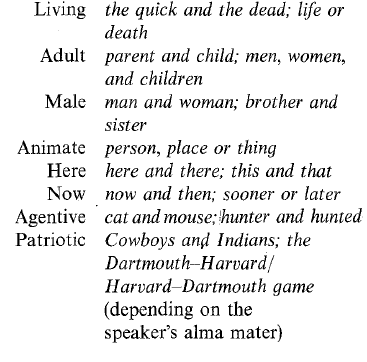
Here's P&B's summary of proposed phonological principles:
And their evaluation of the literature's support for them:
They did an experiment, using nonsense-word binomials, with English native speakers and two classes of English learners to test these ideas:
And a similar experiment with French:
What does all this say about the order of grandparents?
Not much, except that the "quality of initial consonant" principle correctly predicts "ma and pa", and (perhaps by extension and/or by analogy) "grandma and grandpa".
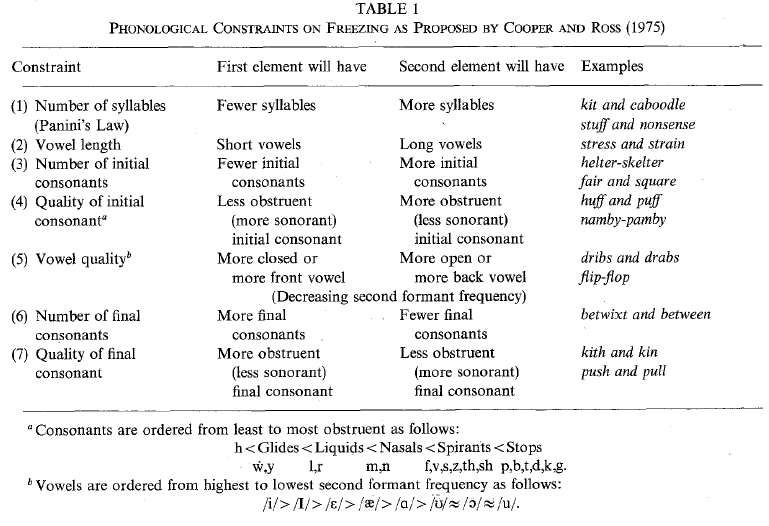
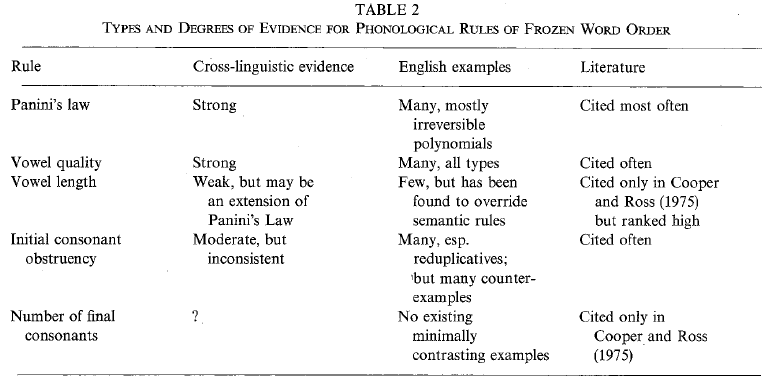
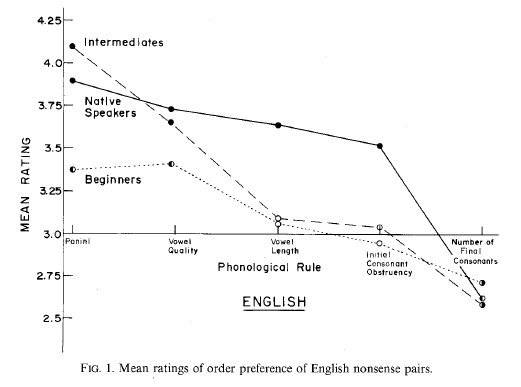
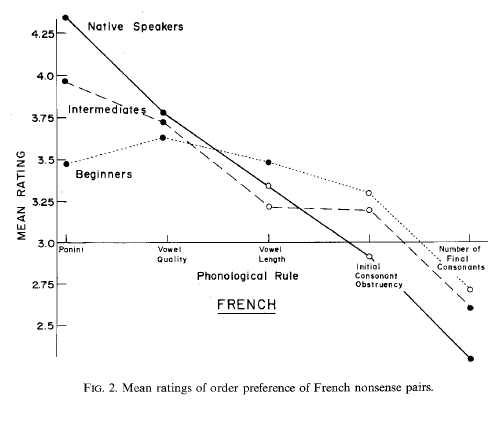
wally said,
December 24, 2009 @ 1:07 pm
Yeah, "mom and dad" seems much more natural than "dad and mom"
JimG said,
December 24, 2009 @ 1:19 pm
but Father and Mother?
John Lawler said,
December 24, 2009 @ 1:43 pm
The way "grandma and grandpa" is usually pronounced in the US (and as a native speaker, I second all the lexical observations — that is indeed the more common order, by a large margin) is /grǽmǝṇgrǽmpǝ/, with the syllabic /ṇ/ only optionally syllabic, i.e, it may be either 4 or 5 syllables.
That means the actual difference in pronunciation is the addition of a stop /p/ to the second element of the freeze, producing a syllable-final /mp/ cluster there, instead of the simple intervocalic /m/ of the first element. That makes the second element heavier, hence following the weaker version of Paṇini's Law that includes syllable mass (2nd element has heavier syllable) instead of merely quantity (2nd element has more syllables).
In addition, it's much easier to drop the syllabicity of the medial 'n' in Gramma'n'Grampa, producing only 4 syllables, than it is to drop it in Grampa'n'Gramma, which normally has to have 5 syllables, I think.
I leave it to licensed phonologists to describe the phenomena theoretically; but these seem like pretty simple observations.
Tom Recht said,
December 24, 2009 @ 1:59 pm
It's interesting that most of the constraints in Table 1 have the effect of making the second element longer or heavier in some sense. This is obviously the case for (1)-(3); rule (5), at least in the English examples, results in a longer-duration vowel in the second element; and in (7), word-final sonorants (I think) slightly lengthen the preceding vowel relative to word-final obstruents, as well as being held longer themselves. (6) would obviously be a counterexample, but it seems to be ill-supported.
If this is true, I wonder whether it's an English tendency, a cross-linguistic tendency, or maybe even a specifically Indo-European tendency (it's tempting to connect it with the IE penchant for placing the largest items at the end of a coordination string).
Nathan said,
December 24, 2009 @ 2:04 pm
I don't see why the mostly obsolete "ma and pa" would have any effect on the current usage of "grandma and grandpa".
If the cross-language question is not about phonology, but just the equivalent of "grandma and grandpa", then Spanish avoids it with the single word abuelos.
David Eddyshaw said,
December 24, 2009 @ 2:07 pm
My Welsh grandparents were
(fy) nain a (fy) nhaid "(my) grandmother and (my) grandfather"
and not
nhaid a nain. Unthinkable. Well, not said, anyway.
The words in isolation are respectively "nain" and "taid" so this would do for Constraint 4.
Amy Stoller said,
December 24, 2009 @ 2:13 pm
@JimG: Mother and Father in my neck of the woods. But usually mom and dad, except for mom-and-pop stores.
Has anyone done a study about the tendency of some dyslexics to speak these common phrases in reverse order from the usual?
[(myl) I've never heard of this interesting idea, and certainly don't know of any study. A small amount of web search doesn't turn anything up, though I'm not at all sure how to search for it. Is it a common observation? I've known a few dyslexics pretty well, and I don't recall noticing any odd binomial orders in their speech or writing. But "dyslexia" is a pretty diverse condition.]
Yuval said,
December 24, 2009 @ 2:16 pm
I've noticed that all the language I know or have asked about (Hebrew, English, French, German, Spanish and more) use as normative "ladies and gentlemen", except for Arabic where this is reversed.
David Eddyshaw said,
December 24, 2009 @ 2:30 pm
On the other hand "brothers and sisters" gets a lot more Google hits than "sisters and brothers", which accords with my own feeling than the former is much more natural.
Perhaps Western European chivalry does not extend as far as siblings.
Ellen K. said,
December 24, 2009 @ 3:49 pm
I take it to be gender bias. Gender bias being why generally, there's a tendency for the male to be listed first. But in some cases, a bias towards female first. Since mothers are generally considered the main parent if one of the parents is seen as such, thus the preference for female first with ma/pa, mom/dad, Grandma/grandpa, etc. With the longer forms, I'm guessing the gender biases tend to balance out. If I were investigating, that's what I'd be looking into.
[(myl) If "the gender biases tend to balance out", i.e. sometimes go one way and sometimes another, wouldn't the rational move be to abandon the hypothesis, at least pending some discovery of an interacting factor that would explain the variations?]
Nathalie said,
December 24, 2009 @ 4:35 pm
In Yiddish, the way you refer to both parents together is "tate-mame" which literally means "dad-mom" but the word for "grandparents" is "bubbazayde", literally "grandma-grandpa". No idea why the genders are reversed but would be interested to know.
Jim said,
December 24, 2009 @ 7:22 pm
"Mom & Pop" (as a store) is another example.
James D said,
December 24, 2009 @ 7:24 pm
@David: the interesting thing is that you repeat "fy" (i.e. the invisible word that affects the nasal mutation) after "a" ("and"), rather than using "a'm" ("and my" + no mutation). I'd personally usually use "(fy) mam-gu a'm tad-cu", but that just shows me up as a hwntw.
Ellen K. said,
December 24, 2009 @ 8:05 pm
@myl. You seem to have missed the point.
In some situations, there is one type of gender bias, giving male first. In other situations, a different gender bias, giving female first. While we can't measure gender bias (since it's inside people's minds), we can look at language use and see if it fits. It's already indicated in what you posted that there's a general male first tendency.
[(myl) I'm not sure whether there's such a tendency or not — the table is a list of things claimed to be true, not things shown to be true. It's hard to evaluate the hypotheses, since many of them apply at the same time (and sometimes point in different directions). Thus "male and female" follows two of the stronger phonological patterns (shorter first and more sonorant first), so it's not clear whether gender is relevant. Same for "ladies and gentlemen"; and mom/mother/ma wins out over dad/father/pa on sonorancy. I'm not clear that there's really much if any independent evidence for a gender effect.
P&B did an experiment to test the strength of the claimed phonological constraints, some of which turned out to matter while others didn't. But they didn't test any semantic constraints.]
Is there a mother-first tendency? That can be looked at.
The ones that don't show a clear gender differentiation (which the data in your post suggests is only some of them), I suggest, could be because they are susceptible to both types of bias (male first, mother first), and sometime one wins out, sometimes the other, depending on speaker or writer and the context. As in, maybe more formal words are more susceptible to the male-first tendency and thus don't show the mother-first tendency.
[(myl) Unfortunately, at the moment we seem to have more principles than we do data points, which is always a troublesome situation.]
David Eddyshaw said,
December 24, 2009 @ 8:19 pm
@James D:
Interesting. Your form is certainly right in that it follows the rules for literary Welsh which presumably reflects the original usage, so mine must be innovative. I just Googled for
"fy mam a nhad"
vs
"fy mam a'm tad"
and found lots more of the latter, but the other way round without the "fy" before "mam". I'm tempted to guess this is to do with levels of formality, but suspect it's simply that spoken Welsh is very variable from place to place.
My own Welsh antecedents are in Argentina (perfectly comprehensible statement to Welshmen, I find, but not to anyone else.)
Apologies to the Saeson for hijacking the thread.
(And good wishes of the Saeson to you all. 00.15, on Dec 25th here in Wales.)
Ron Kephart said,
December 24, 2009 @ 8:25 pm
Has anyone thought of English prescriptive grammarian Thomas Wilson who in 1553 declared that in lists, the natural order should be male first, then female, because males are first in the "natural order?"
Army1987 said,
December 24, 2009 @ 8:33 pm
In Italian, "nonna e nonno" sounds slightly more natural than "nonno e nonna" to me, although most of the semantic preferences in the first table, including the general tendency to put males first, seem to apply to Italian, too.
Faith said,
December 24, 2009 @ 8:43 pm
@Nathalie — I have never heard anyone say "bobe-zeyde". I have only ever heard or said "zeyde-bobe" and I just checked my dictionaries and they say "zeyde-bobe." In what community or context have you heard "bobe-zeyde"? It actually sounds wrong and a bit bizarre to me.
Confused said,
December 24, 2009 @ 9:46 pm
Interestingly enough, HappyMrLocust (who I believe is the guy who does the Bunny comics), is responsible for me reading language log by way of a hat-tip to a LL post in one of his comics. It's interesting to see a nod going back his way!
Mark F. said,
December 24, 2009 @ 11:27 pm
I may be restating what Ellen K. said, but I think this is really just another case of the general "me first" principle. There is an unambiguous tendency for women to be the primary caretaker of children, and grandmothers are likely to interact more with their grandchildren than grandfathers do. So "Mom" is closer than "Dad", and "Grandma" is closer than "Grandpa."
Marion Crane said,
December 25, 2009 @ 8:35 am
As for Dutch grandparents, I would say 'opa en oma', putting my grandfather first. Same for 'papa en mama', with my father first. I'm not sure if this is a male first thing, or because of the types of consonants involved.
Also, I think that Dutch prefers 'peper en zout', opposed to English 'salt and pepper', which feels like a metric choice to me.
David said,
December 25, 2009 @ 10:24 am
As for Swedish, my feeling is strongly that it's "mormor och morfar" (maternal grandparents) and "farmor och farfar" (paternal). But Googling these phrases yield only a 2:1 preference for putting female ancestors first.
However, using Språkbanken (spraakbanken.gu.se/konk), one finds a much stronger preference for "mormor och morfar" while the 2:1 relation for "farmor och farfar" seems to hold up at first glance. Maybe it's because the internal alliteration in "mormor" somehow favours it being put first. All words and phrases are identical with respect to word stress, accent, vowel length and phrase stress, as far as I can tell.
Mr Punch said,
December 25, 2009 @ 1:24 pm
@Yuval — The "ladies and gentlemen" order is not invariable in French. Acknowledging a mixed group encountered on the sidewalk, for example, one might say, "Messieurs-'dames."
Mary Kuhner said,
December 25, 2009 @ 1:44 pm
Teams of two people referred to by the pair of names generally have a fixed order for those names. I noticed this with high school debate partners; my partnership was always Mary/Heather and never the other way around. But I couldn't figure out the rules, except that they depended on the sounds of the names rather than anything about the debaters–you could get a different order if you used first names versus last names.
Asking people to form such team names, or examining already-named teams, could help provide more data for these word-order rules.
ignoramus said,
December 25, 2009 @ 2:12 pm
Impersonal, male first, addressing the powerful first
Personal ,female first, addressing the powerful.
Jorge said,
December 25, 2009 @ 4:50 pm
English "cats and dogs" vs. Spanish "perros y gatos" seems to agree with the quality of initial consonant constraint.
Graeme said,
December 25, 2009 @ 8:44 pm
Mum and Dad overwhelmingly common in Australian English.
Though reflecting feelings from the domestic sphere, it bleeds into a certain type of formal economy.
Thus 'Mum and Dad shareholders' is a media-ism for small investors.
US English has 'mom and pop stores' etc doesn't it, for small or family businesses?
ThomasH said,
December 25, 2009 @ 9:33 pm
The latin Cred has "vivos et mortuos:" support for the proximity theory.
Bloix said,
December 26, 2009 @ 12:19 am
Hebrew says "avot v'imahot" , fathers and mothers – fathers is 2 syllables, mothers is three.
Tarlach said,
December 26, 2009 @ 2:04 am
So its "gender-bias" when the woman is last, and it's "gender-bias" when the woman is first. If you give all possible outcomes the label of gender-bias, you will always be right when you cry gender-bias.
I would explain to you how languages don't have biases, ideologically driven people have biases. But if you are still of the ideology that languages have "gender-bias," you are probably biased against my gender.
David Eddyshaw said,
December 26, 2009 @ 7:42 am
"Husband and wife" seems a good candidate for the ideological rather than phonological explanation.
On the other hand it could simply reflect the order of the older "man and wife", in which the second component actually is heavier phonologically.
It would be interesting, if there are examples of languages which have "wife and husband" predominantly, to see if this correlated with their marriage customs, matrilocal/patrilocal or whatever.
Kenny Easwaran said,
December 27, 2009 @ 3:45 am
Tarlach – the claim is that the language has certain fixed structures as a result of biases that individuals have, and not because the language itself is biased. And the reason that both types of fixed forms are being called "biased" is because the examples with female first are mainly in family terms, while most others are male first. ("Ladies and gentlemen" is one of the few exceptions, but it has a strong push from Panini's law, and is a sort of "etiquette" context rather than a "generic" one.)
Also, I don't think most of the people mentioning gender bias are saying that this is clearly the only explanation – they are just suggesting that it's one possible explanation that should be explored.
GAC said,
December 27, 2009 @ 6:57 am
Chinese invariably puts males before females as far as relatives go, but you could argue that many of these are actually compounds, especially ones that reduce each relative title to one character, like 父母 (father and mother) and 夫妻 (husband [丈夫] and wife [妻子]).
Fred said,
December 27, 2009 @ 9:06 am
Growing up I was obsessed with trying to figure out why some of my parent's married friends used the wife's (first) name first and the husband's second, while others were reversed.
Some examples from American TV to protect my parent's identity: Fred and Wilma, Brangelina, Lucy and Desi (but Fred and Ethel?), Ozzie and Harriet, Burns and Allen, Sonny and Cher, Donnie and Marie, Roseanne and Dan, Edith and Archie, Mickey and Minnie, Dharma and Gregg, Sam and Diane, Will & Grace.
Granted, TV shows throw any possible theory on its ear, since the lead role usually comes first, but I swear that I kept seeing the alternating forms for my parent's friends as well. My guess is that titles give you precedence (Dr. and Mrs. Smith). But in other cases, I convinced myself that sound had something to do with it. It's like handedness, one just feels more right than the other.
Elizabeth said,
December 29, 2009 @ 11:31 am
Seems simple enough why mom/mum and grandma/nana come first – they're both words with more importance and used more often than dad (historically away at work where as mum was at home dealing with the kids) and granddad (historically dead much earlier than grandma, and grandma probably helped rearing the grandchildren more than granddad).
Certainly in my childhood, mum and nana were at the top of important people!
Colin John said,
December 30, 2009 @ 9:20 am
Slight tangent:
I noticed the example given for 'patriotic' (Dartmouth – Harvard or Harvard – Dartmouth). To me that means 2 different things – the first match is being played at Dartmouth and the second at Harvard. I (as a Wolves fan) would say 'Wolves – Villa' for the match in Wolverhampton and 'Villa – Wolves' for the match in Birmingham. In addition, I've also noticed on watching American Football that the US equivalent appears to be the other way round, giving: 'Dolphins at Green Bay'.
Is this true across all US sports, and indeed where would an American assume a match listed as 'Dallas – Chicago' was taking place?
[(myl) In the U.S., both the "X at Y" and "X – Y" versions involve a game on Y's territory. But I don't think that "X and Y" is normally used in this way. Certainly the first few dozen hits for "Harvard and Yale" and for "Yale and Harvard" are not references to particular instances of athletic competition. And similarly, the current news hits for "Philadelphia and Dalls" or "Dallas and Philadelphia" are references to their respective NFL teams, the Eagles and the Cowboys, but in general not specifically to next Sunday's NFC title game in Philadelphia.]